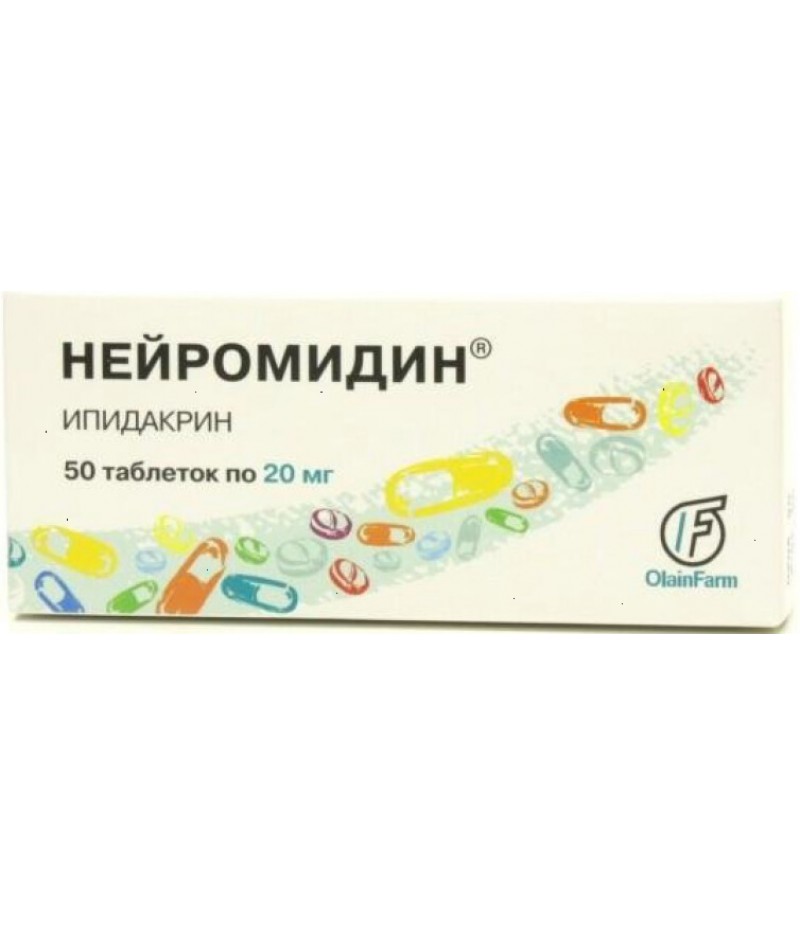Neuromidine tabs 20mg #50
- $52.78
- 2 or more $51.40
- 3 or more $49.99
- Availability:In Stock
Neuromidine instruction for useReed more and buy Neuromidine tabs on this pageCompositionOne tablet contains: 0.2 hydrochloride and ipidacrine + auxiliary substances (starch, calcium stearate, lactose monohydrate).In one ampoule c..
Tags: tabs
Neuromidine instruction for use
Reed more and buy Neuromidine tabs on this page
Composition
One tablet contains: 0.2 hydrochloride and ipidacrine + auxiliary substances (starch, calcium stearate, lactose monohydrate).
In one ampoule contains the active substance (hydrochloride ipidakrina) 0.05 or 0.15 + excipients (water for injection).
Form of issue
In tablets of white color, round form, packing of 10 pieces.
In ampoules, the liquid is clear and colorless, 1 ml each.
pharmachologic effect
Drugs that affect the central nervous system, anticholinesterase drugs.
Pharmacodynamics and pharmacokinetics
Neuromidine is a blocker of calcium channels and reduces the potassium content, respectively, increases the concentration of calcium in nerve cells. Also, the drug prevents cholinesterase in the nerve and muscle fibers. Due to these two processes, the number of mediators such as serotonin, adrenaline, oxytocin, histamine in cells increases. The activity of the postsynaptic cell is enhanced, the mediators can easily pass through the semi-impermeable membrane of the cell. The medicine normalizes the processes of transmission of nerve impulses along the muscle tissue.
In the person taking the drug, the tone of smooth muscles rises, synoptic connections in nerve fibers are restored, the memorization process is facilitated.
After taking the drug, it binds to proteins in the blood and quickly penetrates the target organs. The drug is metabolized in the liver. The maximum concentration in the blood - after 30 minutes. It is excreted from the body with the help of excretory system - through the kidneys with urine and through the digestive tract.
Indications for use Neuromidine
polyneuropathy and mononeuropathy of various degrees of severity;
multiple sclerosis;
diseases of the central nervous system, paralysis;
impaired motor activity after injuries or organic lesions;
indication for the use of the drug in tablets may serve as an inadequate intestinal tone.
Contraindications
Do not administer Neuromidin tablets and injections to children under the age of 14 years.
The tableted form is contraindicated:
patients with arrhythmia and bradycardia;
patients with epilepsy;
with gastric ulcer;
with asthma and allergies to certain substances that make up the drug;
pregnant and lactating women.
Side effects
The medicine intensifies salivation, can cause nausea and vomiting, skin rashes, bronchial spasms and diarrhea.
Instructions for use Neuromidine (Method and dosage)
The drug is given in tablets or parenterally in injections, depending on the disease and the degree of its severity. The maximum amount per day is 0.2 g.
According to the instructions for Neuromedin:
with poly- and mononeuropathy, the drug is given IV or IM at 30 mg per day for 2 times, 10-15 days. Then 3 tablets per day (for 3 doses) for 30-60 days;
for violations of motor activity after injuries or organic lesions, 15 ml of the drug is administered intramuscularly intramuscularly 2 times a day, 15 days;
complex treatment of multiple sclerosis - 1 tablet 4 times a day, 60 days, the course is repeated several times a year;
intestinal atony - 20 mg 3 times a day, for 7-14 days;
various diseases of the central nervous system - 5-15 mg 2 times a day, 10-15 days or 1 tablet 3 times / day for 3-6 months.
Overdose
When an overdose is observed, a decrease in appetite, vomiting, nausea, diarrhea, bronchospasm, cardiac dysfunction (tachycardia, bradycardia), low blood pressure, fear, convulsions, jaundice, general weakness. Treatment is symptomatic, apply Atropine or Cyclodol.
Interaction
The effect of CNS depression is increased with the use of sedatives. Side effects are enhanced with ethanol and other anticholinesterase drugs. The action of anesthetics is weakened. The drug can be used with nootropics.
Storage conditions
In a dark, sheltered from children, a cool place, the temperature is not above 25 degrees.
Shelf life - 18 months.
In pregnancy and lactation
The drug should not be taken during pregnancy due to the fact that it enhances the tone of the uterus. When lactation, the drug is excreted with milk.
Reviews about Neuromidine
Feedback on the reception of tablets are good. In the first days of the drug, memory is improved, the ability to think and analyze soberly, consistently expound information. They write that the drug strongly affects the heart, so it is worthwhile to monitor your health in the process of taking the medicine. Reviews about injections are positive, especially in patients with gastrointestinal problems.
Reviews about the reception of children are practically absent. Many are slow to take the drug, due to the age limitations described in the instructions. Those who decided to take such a serious medicine, as part of complex therapy, are generally happy.

